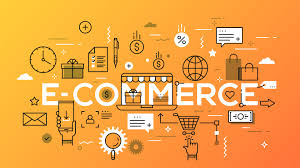Essential E-Commerce Services to Power Your Online Business

The
Complete Guide to E-Commerce
Services: Empowering Your Online Business
In today's fast-paced digital world,
establishing a successful e-commerce business requires more than just listing
products online. It involves a comprehensive understanding of the e-commerce services
ecosystem that can help your business thrive. From hosting platforms to payment
gateways, shipping solutions to customer service tools, each service plays a
critical role in the success of an online store.
This guide will walk you through the
essential e-commerce services you need to scale and succeed in a competitive
marketplace.
1.
Web Hosting & E-Commerce Platforms
Your e-commerce platform is the
foundation of your online business. The platform you choose should offer an
intuitive user experience, scalability, and robust features. Popular platforms
like Shopify, WooCommerce, Magneto, and Big Commerce make it easy
to set up an online store with built-in features, including payment processing,
product listing, and SEO optimization.
- Shopify:
An all-in-one platform that is beginner-friendly, offering a drag-and-drop
interface, integrated payments, and a wide range of customizable
templates.
- WooCommerce:
A plugin for Word Press users that provides powerful tools for customizing
an online store, best suited for those who want complete control over
their website.
- Big Commerce:
Known for its enterprise-level functionality, it is a powerful solution
for businesses looking to scale quickly.
2.
Payment Gateways
Choosing the right payment
gateway is crucial for seamless transactions. A payment gateway is an
e-commerce service that processes and authorizes payments for your store. Some
common examples include PayPal, Stripe, Square, and Authorize.net.
- PayPal:
One of the most widely accepted payment methods globally; PayPal provides
both security and convenience for customers.
- Stripe:
Offers customizable payment processing solutions with powerful developer
tools. It supports a range of payment methods, including credit cards and
digital wallets.
- Square:
Ideal for both online and offline transactions, Square integrates
seamlessly with point-of-sale systems, making it popular among
brick-and-mortar businesses expanding online.
3.
Inventory & Order Management Systems (OMS)
As your business grows, managing
inventory across multiple sales channels becomes complex. Inventory and Order
Management Systems help you track stock levels, manage purchase orders, and
fulfill customer orders efficiently. Examples of popular OMS include Ship
Bob, Trade Gecko, and Veneto.
- Ship Bob:
A third-party logistics provider that handles shipping and fulfillment. It
integrates with popular e-commerce platforms like Shopify and BigCommerce.
- Trade Gecko:
Helps with inventory management and B2B order management, perfect for
wholesalers and manufacturers.
- Veeqo:
Provides multi-channel inventory management and real-time stock updates
across your platforms.
4.
Shipping & Fulfillment Services
Shipping is the backbone of any
e-commerce business. Customers expect fast and affordable delivery options.
Partnering with a reliable shipping service will ensure products reach
your customers on time. Services like FedEx, UPS, DHL, and Ship
Station offer integrations with e-commerce platforms for streamlined
fulfillment.
- FedEx/UPS/DHL: These global carriers offer reliable shipping with
tracking and customizable delivery options.
- Ship Station:
A shipping software that consolidates multiple carriers into one platform,
helping you automate shipping labels, tracking, and customer updates.
5.
Customer Support Tools
Providing excellent customer service
is key to retaining loyal customers. With the right customer support tools,
you can offer real-time support, manage queries, and handle returns with ease.
Popular tools include Zendesk, LifeChat, Gorgas, and Intercom.
- Zendesk:
A customer service software that allows for multi-channel communication,
including email, chat, and phone.
- LifeChat:
Enables instant interaction with website visitors, offering personalized
assistance during their shopping journey.
- Gorgas:
An e-commerce-specific customer support tool that integrates with
platforms like Shopify, automating responses to common questions.
6.
Marketing
Automation & CRM Tools
To drive sales, it’s essential to
have a marketing strategy supported by automation tools. Customer Relationship
Management (CRM) and marketing automation services allow you to segment
audiences, send targeted campaigns, and track customer behavior. Tools like Mailchimp,
Klaviyo, HubSpot, and Salesforce are commonly used.
- Mailchimp:
Known for email marketing, Mailchimp also offers basic CRM capabilities
and marketing automation features.
- Klaviyo:
Tailored specifically for e-commerce businesses, it provides in-depth
analytics and segmentation to target customers with personalized email and
SMS campaigns.
- HubSpot:
A comprehensive CRM solution that integrates with marketing automation,
sales pipelines, and customer support.
7.
Search Engine Optimization (SEO)
Services
Ranking higher on search engines
like Google is critical for driving organic traffic to your online store. SEO
services help optimize your website’s structure, content, and backlinks to
improve visibility. Services like Ahrefs, SEMrush, and Mos. can
help analyze and improve your SEO strategy.
- Ahrens/SEMrush:
Provide keyword research, backlink tracking, and competitor analysis tools
to help you find opportunities to grow your traffic.
- Mos.:
A popular tool for tracking your search engine rankings and improving
local SEO for businesses that have both online and physical stores.
8.
Analytics and Reporting Tools
Data-driven decision-making is
crucial for optimizing your e-commerce store. Analytics tools help track
visitor behavior, conversion rates, and other key performance metrics. Some
useful analytics tools are Google Analytics, Kiss metrics, and Hot
jar.
- Google Analytics:
A free tool that provides in-depth reports on your website’s performance,
including traffic sources, user behavior, and sales funnel tracking.
- kiss metrics:
Focuses on tracking user behavior to optimize conversions and understand
how customers engage with your site.
- Hot jar:
Allows you to visualize how users interact with your website through
heatmaps and session recordings, enabling you to identify UX improvements.


